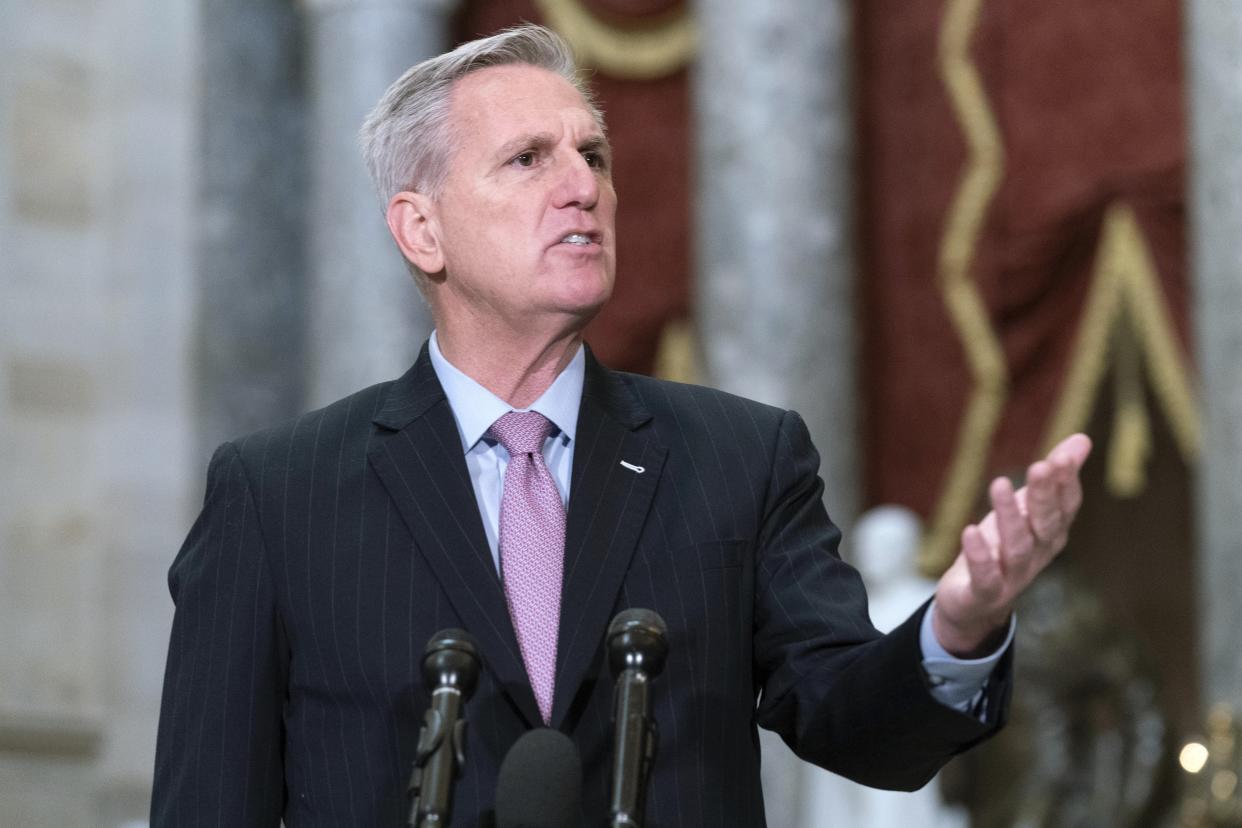Dems bet GOP will walk away with nothing from debt ceiling fight

The debt ceiling is nothing more than a Washington problem at the moment, so there is lots of chatter on the topic inside the Beltway and — with the exception of Wall Street — mostly indifference outside it.
But should Congress fail to raise the debt ceiling in the next few months, Americans won’t have any choice but to snap to attention. Analysts warn that if Congress refuses to raise the ceiling and instead forces the U.S. to default on its debts, the result would be catastrophic, wiping out millions of jobs and trillions in household wealth.
At that point, the national focus will bring intense pressure on members of Congress to reach a deal. This has happened a few times in the past decade. But one Democrat who was at the center of the 2011 debt ceiling showdown thinks that unlike then, this confrontation will end with Republicans getting nothing.
Sen. Chris Van Hollen, D-Md., was a House member in 2011 and was named to a working group led by then-Vice President Joe Biden that negotiated with Republicans. The debt ceiling was then raised in exchange for $900 billion in spending cuts.
But Van Hollen told Yahoo News in an interview that he believes Republicans now are too fractured and have too small a House majority to reach a unified negotiating position.

As public pressure grows to avert an economic crisis in the coming months, Van Hollen said, a handful of Republicans in swing districts will face enormous pressure to pass a clean debt limit increase, through a legislative maneuver known as a “discharge petition.”
“As we get closer and closer to this cliff, and people recognize the disaster that will be faced by the American people if we go over it, there are going to be some of those Republican members that are going to really be pushed hard to sign that discharge petition,” said Van Hollen in an interview.
The discharge petition allows a simple majority in the House to bring a bill to the floor for a vote, without the approval of the House speaker.
“Normally, the power of the speaker is the power to decide to bring up a bill or not bring up a bill,” Van Hollen said.
There are arcane rules around the discharge petition intended to make it difficult. Any proposal brought to the floor this way must be proposed in a committee first and must sit there without any action for 30 days. Once the petition has been signed by 218 members, it can be brought to the floor for a vote only after seven legislative days and “only on a second or fourth Monday of a month,” according to the Congressional Research Service.
“We only need a very few number of Republicans. You only need four, five to get to the majority,” Van Hollen said.

He acknowledged that he does not know, at this moment, which Republicans might join with Democrats to pass a clean debt ceiling hike.
In essence, Washington is too relaxed about the debt ceiling at this point for it to become clear which House Republicans might join Democrats to pass an increase. Because the ceiling has always been raised in the past, there is a sense of complacency among politicians and business leaders who believe the two parties will eventually reach a deal.
That will change, Van Hollen argued, as time passes and the prospect of a real economic crisis looms larger.
“Those House members — some of whom are representing districts that President Biden carried — are going to be getting an earful from their constituents, their small businesses, their medium-sized businesses, their larger businesses, as to the consequences for the country of not paying our bills on time,” he said.
It is possible that House Republicans will figure out what they want to negotiate toward and will unify their slim majority around a clear position from which to negotiate. But at the moment, the House GOP is fractured between a multitude of voices calling for different things. Some want to cut Social Security and Medicare, while others — including Speaker Kevin McCarthy — say no way. Some Republicans want to cut defense spending, and others are adamantly opposed.
“They're going to have to get their act together beyond saying, ‘We want budget cuts,’” Van Hollen said. “They have to be more specific.” He reiterated moments later that if Republicans want to cut spending, “the place to have that discussion is part of the appropriations bills,” which are part of the budget process.

Matthew Yglesias, a political writer with one of the most successful Substack columns on U.S. politics, wrote Thursday that “Republicans are trying to hold a negotiation about this, but they don’t actually have a negotiating position.”
And in general, Republicans are making outlandish promises about their ability to cut federal spending or balance the budget that even conservative budget experts view as nonserious, though these same experts agree that spending, deficits and debt all badly need to be reined in.
GOP rhetoric also ignores political realities. The party doesn’t control the White House or the Senate, so its power is vastly limited.
Republicans' motives are in question as well. The GOP increased rather than reduced spending when the party did control the presidency and both chambers of Congress from 2017 to 2019.
One House Republican leader, Rep. Kevin Hern of Oklahoma, acknowledged this fact. “Republicans are just as guilty [as Democrats] at spending,” said Hern, chairman of the powerful Republican Study Committee (RSC), in an interview with Yahoo News.
Hern said he would be releasing a letter next week laying out what the RSC, which includes 156 of the 222 House Republicans, thinks the GOP should push for in a debt ceiling negotiation.
“I have strong feelings on this conversation,” he told Yahoo News. “While I don't have the ability to be prescriptive about what the speaker puts on the floor ... I have a letter already written.
“I'm not out here trying to burn the place down for the sake of shutting down, not paying the debt, not sending some wrong signal to our debt holders,” Hern said.
